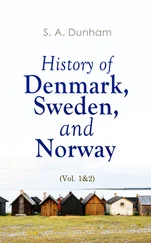S. A. Dunham - The History of Denmark, Sweden and Norway
Здесь есть возможность читать онлайн «S. A. Dunham - The History of Denmark, Sweden and Norway» — ознакомительный отрывок электронной книги совершенно бесплатно, а после прочтения отрывка купить полную версию. В некоторых случаях можно слушать аудио, скачать через торрент в формате fb2 и присутствует краткое содержание. Жанр: unrecognised, на английском языке. Описание произведения, (предисловие) а так же отзывы посетителей доступны на портале библиотеки ЛибКат.
- Название:The History of Denmark, Sweden and Norway
- Автор:
- Жанр:
- Год:неизвестен
- ISBN:нет данных
- Рейтинг книги:4 / 5. Голосов: 1
-
Избранное:Добавить в избранное
- Отзывы:
-
Ваша оценка:
- 80
- 1
- 2
- 3
- 4
- 5
The History of Denmark, Sweden and Norway: краткое содержание, описание и аннотация
Предлагаем к чтению аннотацию, описание, краткое содержание или предисловие (зависит от того, что написал сам автор книги «The History of Denmark, Sweden and Norway»). Если вы не нашли необходимую информацию о книге — напишите в комментариях, мы постараемся отыскать её.
The Pagan Age:
Denmark (B.C. 40 to A.D. 1014)
Sweden (A.C. 70 to A.D. 1001)
Norway (about A.C. 70 to A.D. 1030)
Maritime Expeditions of the Northmen During the Pagan Times:
In England, France, and Ireland
Maritime Expeditions of the Northmen During the Pagan Times:
In the Orkneys, the Hebrides, Iceland, Greenland, North America, Russia, etc.
Cosmogony and Religion of Scandinavia
Introduction of Christianity Into Denmark and Sweden
The Middle Age:
Denmark (1014-1387)
Norway (1030-1387)
Sweden (1001-1389)
The History of Denmark, Sweden and Norway — читать онлайн ознакомительный отрывок
Ниже представлен текст книги, разбитый по страницам. Система сохранения места последней прочитанной страницы, позволяет с удобством читать онлайн бесплатно книгу «The History of Denmark, Sweden and Norway», без необходимости каждый раз заново искать на чём Вы остановились. Поставьте закладку, и сможете в любой момент перейти на страницу, на которой закончили чтение.
Интервал:
Закладка:
|448 to 545.|
Egil , whose blood should have stained the altar of Odin, became, by his father’s death, monarch of the Swedes. He now experienced an enemy in Tunne, who, though a slave, had been the treasurer of Aun. As Tunne had tasted the sweets of power, he had no wish to revert to his former condition; and when he perceived that no distinction was made between him and his fellows, he repaired to the spot where Aun had buried a large treasure, dug it up, and with it hired a numerous body of men to execute his purposes. At first the new chief betook himself to the less accessible parts of the country; by degrees, as his band increased—and there can be no doubt, by proclaiming a servile war, it rapidly increased—he issued from the mountain or the forest, and swept the neighbouring plains. He was a bandit on a large scale. Egil raised some force, and hastened to chastise the rebel; but, being surprised by night in his camp, he lost many of his followers, and was compelled to consult his safety by flight. This signal event increased the power of the rebel, and though forces were repeatedly brought into the field, victory declared for Tunne in eight consecutive engagements. In this emergency the king fled to the court of the Danish king, Frode V., in Zealand, and offered as the condition of aid an annual tribute. Frode accepted the offer; and, with a Danish reinforcement, Egil triumphed over the rebel. During the three years which intervened between this event and his own death, Egil sent large presents to the Danish king; but he would not allow them to be called tribute. Death was to him, like most of the Ynglings, tragical: it was occasioned by a wild bull, while hunting in the forest. Ottar , the son of Egil, succeeded. Being summoned by the Danish king to pay the tribute which had been promised, he returned a peremptory refusal. Frode invaded Swionia, laid waste the country; while Ottar, equipping a powerful armament, disembarked in Zealand, and committed equal depredations. But the latter was defeated and slain by the Danes, and his body exposed to the fury of wild beasts. Adils , the son of Ottar, was the next king. He was a noted pirate, who, in summer, visited and ravaged most of the coasts round the Baltic. On one occasion he descended on that of Saxony, laid waste the country, took much spoil, among which was Ursa, a lady of surpassing beauty. Of her the victor became enamoured, and he married her: but, being expelled from his kingdom by Helge, the son of Halfdan, who reigned at Ledra, this queen fell into the power of the victor, who, also, married her, and the issue of this union was Rolf Krake. But Ursa, who was discovered to be the daughter of Helge, returned to the court of Adils, with whom she remained during the rest of her life. On the death of Helge, in one of his piratical expeditions, Rolf, or Rollo, young as he was, was acknowledged king of Ledra. Adils did not long survive his enemy; he was killed by the fall of his horse. [130] Eystein , the son of Adils, next swayed the sceptre of the Swedes. His reign was a troubled one, his kingdom being continually infested by the royal ships of Denmark and Norway, or, what was worse, by the fierce sea kings. “In those days,” says Snorro, “were many sea kings, who levied large forces, though they had no countries to rule. He was esteemed worthy to be a sea king who never slept under a tent, and never emptied his horn by the hearth side.” The most powerful enemy of Eystein was Solvi, a chief of the Jutes, whose piratical expeditions were known on many coasts. One night this marauder advanced to the tent where Eystein was entertaining his friends; and setting fire to the place, all within were consumed. To obtain the royal title, Solvi hastened to Sigtuna; and for a moment he enjoyed it: but the inhabitants rising to avenge their late king, and to free themselves from the new yoke, this adventurer soon bade farewell to empire and to life. The lawful successor of Eystein was his son Yngvar , who, being of a martial disposition, visited many coasts. But in 545 he was slain on that of Esthonia. [131]
|545 to 623.|
The next person who filled the throne of the Ynglings, Braut-Onund , was a much wiser man than his predecessors. His great object was, to clear the forests, to drain the marshes of Swionia, and thus, to convert desert and useless into arable and pasture land. His efforts were crowned with success. Where the stagnant pool had stood, golden harvests waved; forests were replaced by huts full of industrious labourers; and highways were made to pass over mountain and fen. “Many,” says Snorro, “were the provincial kings subject to him.” But this patriotic monarch, like so many of the Ynglinga, came to an untimely end: as he and his retinue were one day in the mountains, they were overwhelmed by a huge avalanche. The sceptre now devolved to the unfortunate Ingiald Illrada , son of the deceased king. In his infancy this prince, we are told, was of too gentle, too mild a disposition, for the turbulent people with whom he had to deal. This defect, however, was cured by a peculiar diet—that of roasted wolves’ hearts; and Ingiald became as ferocious as he had formerly been the reverse. But this change of character was not for the happiness of the Swedes; and he was destined to be the last of the Ynglings that should rule at Upsal. His first object was, to exterminate the local kings, who, like mushrooms, had sprung up in the country, and who, though subject to the descendants of Odin, frequently acted as if they were independent. In the entertainment which he gave at Upsal, alike to celebrate the obsequies of his father, and his own inauguration, his character was fully displayed. Here were six kings—all who owed obedience to Ingiald, except the one of Sudermania—with a great number of jarls, and other nobles. On these occasions, the king, or jarl, previous to receiving the homage of all present—a homage expressed by a general shout—seated himself on a low seat at the foot of the one which his predecessor had filled. The Bragacup was then brought, filled with wine to the brim; and this the new heir, after giving some pledge, was expected to quaff before he ascended the high seat. When the cup—a huge horn—was brought to Ingiald, before emptying it, he vowed to Braga, the god, that he would, in every direction, double his dominions, or perish in the attempt. They who applauded the vow little foresaw the fate which awaited them. That very night the six kings and the jarls were burnt, together with the house of feasting. By this atrocious act Ingiald was absolute master of all Swionia, except that district of Sudermania which owed obedience to the absent king, Grammar. This king soon heard of the deed; and knowing that his own life was menaced, he entered into an alliance with a famous sea king, Hiorvardar by name, to whom he gave his daughter Hildegund. The entertainment at which this marriage was first projected is characteristic of the manners of the times. On one high seat was king Granmer; on another, the pirate king; and by the side of each sat his chiefs and friends. To honour the guest, Granmer called for his daughter Hildegund to present the cup. She appeared, beautiful as the day, filled the cup, and approaching Hiorvardar, said, “Hail to the Ilsings! I drink to the memory of Rolf Krake!” [132]She then emptied the half of the cup, and presented it to Hiorvardar, who, seizing it and her hand, prayed her to sit beside him. “Such,” replied the damsel, “is not the custom of pirates; they do not allow females to sit and drink with them.” “Never mind that custom,” pursued the chief; “but be persuaded to share my seat and cup.” Hildegund yielded; she drank and talked with the chief until the night was far advanced; and the next day she was affianced to him. By this alliance Granmer acquired a valiant ally; and in the battle which both had soon to wage against Ingiald they were the victors. The monarch of the Swedes was compelled to flee; but, through the intervention of friends, peace was concluded, on this condition—that, so long as the three lived, not one of them should molest the others. Granmer could now go to Upsal to join in the great sacrifice and to consult the oracles. The response was, that his days were numbered: and numbered they were. While he and his son-in-law were in one of their rural manors, Ingiald, with a select force, silently approached and consumed with fire both them and the house. He then subjugated the districts which the two kings had ruled, and those of their allies. His surname of Illrada , the Deceitful, sufficiently shows the estimation in which he was held. He had a daughter, Asa by name, who was the heiress of his bad qualities. Married to Gudred king of Scania, she persuaded her husband to murder his brother, Halfdan III., king of Zealand. She then joined in a plot for the destruction of her husband; but this object was no sooner effected than she was obliged to flee for protection to the court of Upsal. Yet here she was not safe. Ivar Vidfadme, the son of Halfdan, in the resolution of avenging his father’s death, invaded Swionia, and wrapped it in blood and flames. When the news of this invasion reached Ingiald, he was at an entertainment, with his daughter and many nobles. He knew that he was hated; that resistance was impossible; that escape was hopeless; and by the advice of Asa he adopted an expedient which would, for ever, make his death as remarkable as his life. This was, to burn himself, his daughter, his guests, together with the house which contained them. [133]
Читать дальшеИнтервал:
Закладка:
Похожие книги на «The History of Denmark, Sweden and Norway»
Представляем Вашему вниманию похожие книги на «The History of Denmark, Sweden and Norway» списком для выбора. Мы отобрали схожую по названию и смыслу литературу в надежде предоставить читателям больше вариантов отыскать новые, интересные, ещё непрочитанные произведения.
Обсуждение, отзывы о книге «The History of Denmark, Sweden and Norway» и просто собственные мнения читателей. Оставьте ваши комментарии, напишите, что Вы думаете о произведении, его смысле или главных героях. Укажите что конкретно понравилось, а что нет, и почему Вы так считаете.












